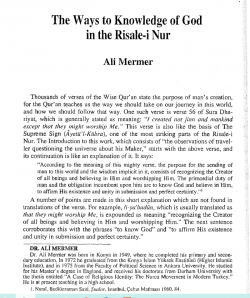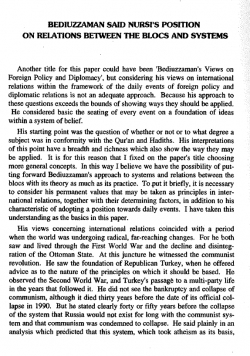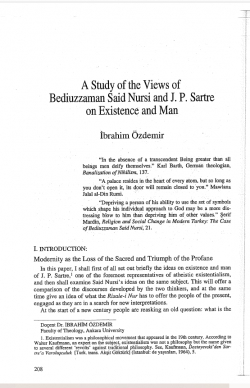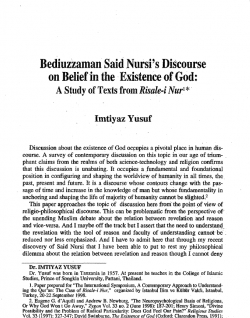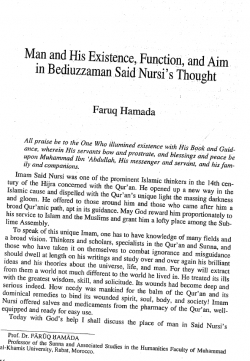Ph.D. Thesis - Doktora Tezi Said Nursi’s Arguments for the Existence of God in Risâle-i Nur
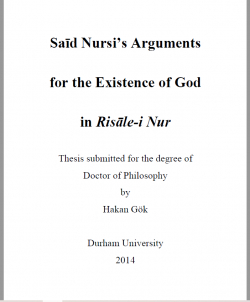
Book Stores
Type
E-Book
Authors
GÖK ( Hakan )
Category
Ph.D. Thesis - Doktora Tezi
[ Browse Items ]
Publication Year
2014
Publisher
Durham University, United Kingdom
Pages
325
Subject
Religion
Tags
Series Name
Abstract
This dissertation examines the philosophical and theological writings of Saīd Nursi
(1877–1960) entitled Risāle-i Nur (Epistles of Light), and presents a critical analysis
of his arguments for the existence of God. Although certain aspects of Nursi’s
writings have been studied at various academic levels, his ways of arguing for the
existence of God, and defending his position against the sceptics have not been
studied at doctoral level. Therefore, the objective of this study is to understand
Nursi’s arguments, then try locate him among other philosophers and scholars and
bring out into light his original viewpoints in this context.
The thesis consists of six chapters. Chapter 1 presents the historical background and
the overview of main theistic arguments from the Christian, Islamic and Jewish points
of views concerning God’s existence. The theistic arguments analysed are: the
ontological arguments, the cosmological arguments, including the kalām
cosmological arguments, the teleological arguments, which are also known as
arguments to or arguments from apparent design, the arguments from morality and
conscience, and, finally, the arguments from miracles and religious experience.
Counter-arguments to the theistic arguments posed by the sceptics are also examined
such as problem of evil, the problem of Hell, and the poor design arguments. In this
chapter, we also aim to sum up some of the chief arguments in order to prepare some
basis for this study. These arguments are analysed from Nursian viewpoint in later
chapters.
Chapter 2 provides an overview of the life and thoughts of Saīd Nursi and explores
how and why his discourse changed from political activism into that of intellectual and spiritual life. Certain terminologies that have been developed by Nursi are
discussed here.
The Ensuing four Chapters, from 3 to 6 analyse four different arguments employed by
Saīd Nursi’s for the existence and the unity of God (tawḥīd). The first argument, ‘the
great book of the universe’, which is, in modern philosophy, the equivalent of the
design argument is discussed in Chapter 3. Chapter 4 examines the second argument
which Nursi calls the argument from prophethood (nubuwwah), with a particular
focus on Prophet Muḥammad. Chapter 5 deals with the third argument, i.e. from
Scriptures (waḥy), with the Qur’ān as the main focus. Finally, Chapter 6 discusses
Nursi’s fourth argument that is conscience (wijdān) and the primordial human nature
(fıṭrat-ı bashar).
In addition, the critics posed specially by the atheist and the sceptics are subjected to
an evaluation from Nursi’s perspective. Darwinian theory of evolution as an
alternative to creation, criticisms to the Qur’ān and the Prophet Muḥammad, and
philosophical issues such as the problem of evil and hell are among the challenges to
which Nursi responds.
The thesis concludes that Nursi’s first three arguments i.e. the design argument, the
argument from prophethood and the argument from scriptures, despite certain
different interpretations by Nursi, seem to be a continuations of the traditional
argument. However, Nursi’s originality lays in his moral argument or the argument,
namely, the argument from primordial human nature.
(1877–1960) entitled Risāle-i Nur (Epistles of Light), and presents a critical analysis
of his arguments for the existence of God. Although certain aspects of Nursi’s
writings have been studied at various academic levels, his ways of arguing for the
existence of God, and defending his position against the sceptics have not been
studied at doctoral level. Therefore, the objective of this study is to understand
Nursi’s arguments, then try locate him among other philosophers and scholars and
bring out into light his original viewpoints in this context.
The thesis consists of six chapters. Chapter 1 presents the historical background and
the overview of main theistic arguments from the Christian, Islamic and Jewish points
of views concerning God’s existence. The theistic arguments analysed are: the
ontological arguments, the cosmological arguments, including the kalām
cosmological arguments, the teleological arguments, which are also known as
arguments to or arguments from apparent design, the arguments from morality and
conscience, and, finally, the arguments from miracles and religious experience.
Counter-arguments to the theistic arguments posed by the sceptics are also examined
such as problem of evil, the problem of Hell, and the poor design arguments. In this
chapter, we also aim to sum up some of the chief arguments in order to prepare some
basis for this study. These arguments are analysed from Nursian viewpoint in later
chapters.
Chapter 2 provides an overview of the life and thoughts of Saīd Nursi and explores
how and why his discourse changed from political activism into that of intellectual and spiritual life. Certain terminologies that have been developed by Nursi are
discussed here.
The Ensuing four Chapters, from 3 to 6 analyse four different arguments employed by
Saīd Nursi’s for the existence and the unity of God (tawḥīd). The first argument, ‘the
great book of the universe’, which is, in modern philosophy, the equivalent of the
design argument is discussed in Chapter 3. Chapter 4 examines the second argument
which Nursi calls the argument from prophethood (nubuwwah), with a particular
focus on Prophet Muḥammad. Chapter 5 deals with the third argument, i.e. from
Scriptures (waḥy), with the Qur’ān as the main focus. Finally, Chapter 6 discusses
Nursi’s fourth argument that is conscience (wijdān) and the primordial human nature
(fıṭrat-ı bashar).
In addition, the critics posed specially by the atheist and the sceptics are subjected to
an evaluation from Nursi’s perspective. Darwinian theory of evolution as an
alternative to creation, criticisms to the Qur’ān and the Prophet Muḥammad, and
philosophical issues such as the problem of evil and hell are among the challenges to
which Nursi responds.
The thesis concludes that Nursi’s first three arguments i.e. the design argument, the
argument from prophethood and the argument from scriptures, despite certain
different interpretations by Nursi, seem to be a continuations of the traditional
argument. However, Nursi’s originality lays in his moral argument or the argument,
namely, the argument from primordial human nature.
Number of Copies
1
| Library | Accession No | Call No | Copy No | Edition | Location | Availability |
|---|---|---|---|---|---|---|
| Main | 183 | 1 | Yes |
